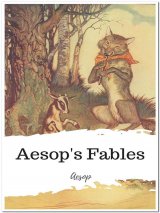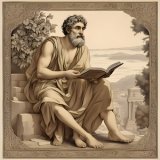Aesop's Fables Page #27
Aesop's Fables, or the Aesopica, is a collection of fables credited to Aesop, a slave and storyteller believed to have lived in ancient Greece between 620 and 564 BCE.
THE FOX AND THE BRAMBLE In making his way through a hedge a Fox missed his footing and caught at a Bramble to save himself from falling. Naturally, he got badly scratched, and in disgust he cried to the Bramble, "It was your help I wanted, and see how you have treated me! I'd sooner have fallen outright." The Bramble, interrupting him, replied, "You must have lost your wits, my friend, to catch at me, who am myself always catching at others." THE FOX AND THE SNAKE A Snake, in crossing a river, was carried away by the current, but managed to wriggle on to a bundle of thorns which was floating by, and was thus carried at a great rate down-stream. A Fox caught sight of it from the bank as it went whirling along, and called out, "Gad! the passenger fits the ship!" THE LION, THE FOX, AND THE STAG A Lion lay sick in his den, unable to provide himself with food. So he said to his friend the Fox, who came to ask how he did, "My good friend, I wish you would go to yonder wood and beguile the big Stag, who lives there, to come to my den: I have a fancy to make my dinner off a stag's heart and brains." The Fox went to the wood and found the Stag and said to him, "My dear sir, you're in luck. You know the Lion, our King: well, he's at the point of death, and has appointed you his successor to rule over the beasts. I hope you won't forget that I was the first to bring you the good news. And now I must be going back to him; and, if you take my advice, you'll come too and be with him at the last." The Stag was highly flattered, and followed the Fox to the Lion's den, suspecting nothing. No sooner had he got inside than the Lion sprang upon him, but he misjudged his spring, and the Stag got away with only his ears torn, and returned as fast as he could to the shelter of the wood. The Fox was much mortified, and the Lion, too, was dreadfully disappointed, for he was getting very hungry in spite of his illness. So he begged the Fox to have another try at coaxing the Stag to his den. "It'll be almost impossible this time," said the Fox, "but I'll try"; and off he went to the wood a second time, and found the Stag resting and trying to recover from his fright. As soon as he saw the Fox he cried, "You scoundrel, what do you mean by trying to lure me to my death like that? Take yourself off, or I'll do you to death with my horns." But the Fox was entirely shameless. "What a coward you were," said he; "surely you didn't think the Lion meant any harm? Why, he was only going to whisper some royal secrets into your ear when you went off like a scared rabbit. You have rather disgusted him, and I'm not sure he won't make the wolf King instead, unless you come back at once and show you've got some spirit. I promise you he won't hurt you, and I will be your faithful servant." The Stag was foolish enough to be persuaded to return, and this time the Lion made no mistake, but overpowered him, and feasted right royally upon his carcase. The Fox, meanwhile, watched his chance and, when the Lion wasn't looking, filched away the brains to reward him for his trouble. Presently the Lion began searching for them, of course without success: and the Fox, who was watching him, said, "I don't think it's much use your looking for the brains: a creature who twice walked into a Lion's den can't have got any." THE MAN WHO LOST HIS SPADE A Man was engaged in digging over his vineyard, and one day on coming to work he missed his Spade. Thinking it may have been stolen by one of his labourers, he questioned them closely, but they one and all denied any knowledge of it. He was not convinced by their denials, and insisted that they should all go to the town and take oath in a temple that they were not guilty of the theft. This was because he had no great opinion of the simple country deities, but thought that the thief would not pass undetected by the shrewder gods of the town. When they got inside the gates the first thing they heard was the town crier proclaiming a reward for information about a thief who had stolen something from the city temple. "Well," said the Man to himself, "it strikes me I had better go back home again. If these town gods can't detect the thieves who steal from their own temples, it's scarcely likely they can tell me who stole my Spade." THE PARTRIDGE AND THE FOWLER A Fowler caught a Partridge in his nets, and was just about to wring its neck when it made a piteous appeal to him to spare its life and said, "Do not kill me, but let me live and I will repay you for your kindness by decoying other partridges into your nets." "No," said the Fowler, "I will not spare you. I was going to kill you anyhow, and after that treacherous speech you thoroughly deserve your fate." THE RUNAWAY SLAVE A Slave, being discontented with his lot, ran away from his master. He was soon missed by the latter, who lost no time in mounting his horse and setting out in pursuit of the fugitive. He presently came up with him, and the Slave, in the hope of avoiding capture, slipped into a treadmill and hid himself there. "Aha," said his master, "that's the very place for you, my man!" THE HUNTER AND THE WOODMAN A Hunter was searching in the forest for the tracks of a lion, and, catching sight presently of a Woodman engaged in felling a tree, he went up to him and asked him if he had noticed a lion's footprints anywhere about, or if he knew where his den was. The Woodman answered, "If you will come with me, I will show you the lion himself." The Hunter turned pale with fear, and his teeth chattered as he replied, "Oh, I'm not looking for the lion, thanks, but only for his tracks." THE SERPENT AND THE EAGLE An Eagle swooped down upon a Serpent and seized it in his talons with the intention of carrying it off and devouring it. But the Serpent was too quick for him and had its coils round him in a moment; and then there ensued a life-and-death struggle between the two. A countryman, who was a witness of the encounter, came to the assistance of the Eagle, and succeeded in freeing him from the Serpent and enabling him to escape. In revenge the Serpent spat some of his poison into the man's drinking-horn. Heated with his exertions, the man was about to slake his thirst with a draught from the horn, when the Eagle knocked it out of his hand, and spilled its contents upon the ground. One good turn deserves another. THE ROGUE AND THE ORACLE A Rogue laid a wager that he would prove the Oracle at Delphi to be untrustworthy by procuring from it a false reply to an inquiry by himself. So he went to the temple on the appointed day with a small bird in his hand, which he concealed under the folds of his cloak, and asked whether what he held in his hand were alive or dead. If the Oracle said "dead," he meant to produce the bird alive: if the reply was "alive," he intended to wring its neck and show it to be dead. But the Oracle was one too many for him, for the answer he got was this: "Stranger, whether the thing that you hold in your hand be alive or dead is a matter that depends entirely on your own will."
Translation
Translate and read this book in other languages:
Select another language:
- - Select -
- 简体中文 (Chinese - Simplified)
- 繁體中文 (Chinese - Traditional)
- Español (Spanish)
- Esperanto (Esperanto)
- 日本語 (Japanese)
- Português (Portuguese)
- Deutsch (German)
- العربية (Arabic)
- Français (French)
- Русский (Russian)
- ಕನ್ನಡ (Kannada)
- 한국어 (Korean)
- עברית (Hebrew)
- Gaeilge (Irish)
- Українська (Ukrainian)
- اردو (Urdu)
- Magyar (Hungarian)
- मानक हिन्दी (Hindi)
- Indonesia (Indonesian)
- Italiano (Italian)
- தமிழ் (Tamil)
- Türkçe (Turkish)
- తెలుగు (Telugu)
- ภาษาไทย (Thai)
- Tiếng Việt (Vietnamese)
- Čeština (Czech)
- Polski (Polish)
- Bahasa Indonesia (Indonesian)
- Românește (Romanian)
- Nederlands (Dutch)
- Ελληνικά (Greek)
- Latinum (Latin)
- Svenska (Swedish)
- Dansk (Danish)
- Suomi (Finnish)
- فارسی (Persian)
- ייִדיש (Yiddish)
- հայերեն (Armenian)
- Norsk (Norwegian)
- English (English)
Citation
Use the citation below to add this book to your bibliography:
Style:MLAChicagoAPA
"Aesop's Fables Books." Literature.com. STANDS4 LLC, 2025. Web. 12 Jan. 2025. <https://www.literature.com/book/aesop%27s_fables_316>.




Discuss this Aesop's Fables book with the community:
Report Comment
We're doing our best to make sure our content is useful, accurate and safe.
If by any chance you spot an inappropriate comment while navigating through our website please use this form to let us know, and we'll take care of it shortly.
Attachment
You need to be logged in to favorite.
Log In